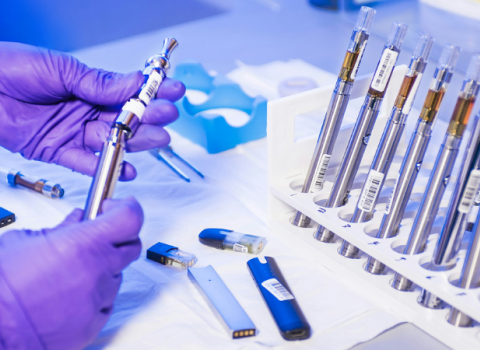
A caveat from Philippe Pouletty: “Good ideas…must be implemented with greater ambition and efficacy.”
The French biotechnology industry experienced record years in 2006 and 2007 in terms of finance and funding. But reforms to the innovation financing chain and public-sector research need to be carried through to implementation if France is to catch up with the leaders, according to France Biotech’s annual “French Biotechnology Panorama” survey, released at the show.
Following on from its 19 June 2007 "Call to Innovate" addressed to French President Nicolas Sarkozy, the organisation warned the government and the French parliament that a number of welcome measures, such as wealth tax rebates on investments in SMEs and the forthcoming Research Tax Credit reform, run the risk of having little or no impact on innovative SMEs due to poor modelling of their likely effects and the lack of a detailed, global vision of the leveraging effect that public funding has on private-sector research.
“These good ideas – reforming personal wealth tax, savings, the Industrial Innovation Agency and university-based research – must be implemented with greater ambition and efficacy so that biotech start-ups can become true industrial (and, in some cases, multinational) businesses,” said Philippe Pouletty, Chairman of France Biotech.
He added, “The personal wealth tax reform in favour of investment in SMEs will, as it currently stands, be ineffective because the investment is capped at a derisory €200,000 and, furthermore, investments by specialist funds are not eligible.”
Despite these caveats, the 6th edition of the French Biotechnology Panorama, France Biotech’s annual survey, shows the country’s biotech firms made huge headway in 2006 and 2007.
As of mid-September 2007, the year looks set to be a record one in terms of investment in life science companies, with a total of €625 million invested, comprising €499 million raised on the stock market and €126 million from venture capitalists.
The stock market window, which had been closed since 1999, first reopened in late 2005 with IPOs from BioAlliance Pharma and ExonHit and a secondary offering from Transgene, raising €72 million in total. These were followed in late 2006 with IPOs from Innate Pharma and Genfit and secondary offerings from Eurofins, Transgene and ExonHit, raising €240 million overall.
Investors regain appetite
The first nine months of 2007 have confirmed the investors’ appetite for biotechnology companies with four companies, Cellectis, METabolic Explorer, Genoway and Vivalis listing on the stock market as of 15 September, and four companies going back to the market with secondary offerings.
As of September 15, the French industry has jumped from four listed companies in early 2005 to 13 today, and French companies now account for around half of the biotechnology firms listed on the NYSE Euronext markets.
It is clear also that an improved stock market climate has boosted the upstream financing chain in general and venture capital in particular, which fell to a meagre €99 million in 2005, and then recovered to €148 million in 2006 and €126 million by mid-September 2007.
Similarly, staff numbers in biotech companies rose by 10 per cent between 2005 and 2006, with 68 per cent of these jobs in R&D jobs. France Biotech says that three years after its introduction, the effect of the Young Innovative Company fiscal status, originally conceived by France Biotech and the Strategic Innovation Council, remains a driver of company formation and growth.
The status has been adopted by 1,700 French companies, one in five of which are in the biotechnology sector. In all, two-thirds of the country's biotech firms have opted for this tax regime, which exempts them from social security contributions on research staff salaries, representing an average 20 per cent saving, as long as their R&D spend accounts for at least 15 percent of total expenditure.
These allowances have been immediately reinvested in corporate R&D with three out of four companies recruiting more R&D personnel, three out of four initiating new R&D projects and three out of four purchasing extra R&D equipment.
In 2006, companies in the survey invested a total of €195 million in R&D. The amount of public funding granted to SMEs with less than 250 staff (in all sectors of the economy) was estimated at €735 million by the government's Directorate General for Enterprises. Assuming that the biotechnology sector took around 20 per cent of SME funding, public-sector grants made available to the life science industry totalled around €150 million.
Leverage of public grants ‘significant’
“The leverage effect of public grants-in-aid on R&D expenditure by biotechnology start-ups (1.3 for 1) is thus quite significant,” says France Biotech. Furthermore, the leverage effect on venture capital raised is 1 for 1, a figure which puts France on the same level as its British and Germans neighbours in 2001.
And these improvements in financing are being translated into a significant number of drugs in development within biotechnology SMEs. Currently, 68 products from 46 SMEs are in clinical trials, including 41 in phases II and III.
Elsewhere, there are significant developments in diagnostics, the environmental sector, bioenergy and other industrial applications of biotechnology.
But, says France Biotech, “This improvement and these encouraging results must not, however, cause us to lose sight of the persistent performance gap between France and its neighbours and, of course, the fact that Europe as a whole lags behind the US.”
Depending on the indicator in question, France is ranked 3rd or even 4th in Europe, with a fifth the number of listed companies in the UK and a total stock market cap a third the size of British companies.
Several French companies are progressing well in international terms and have shown that they can make the most of well-targeted public grants. Today's key issue is to avoid sprinkling the funding around too lightly, says France Biotech. “Efforts must be focused on the companies which will generate tomorrow's growth and innovations.”
This was the essence of France Biotech's recommendations in its 19 June 2007 "Call to Innovate", addressed to President Sarkozy, which sent the following message. “France must keep its biotechnology industry flying if it is to reach its cruising speed, and act as a key driver in Europe and worldwide.”





 A unique international forum for public research organisations and companies to connect their external engagement with strategic interests around their R&D system.
A unique international forum for public research organisations and companies to connect their external engagement with strategic interests around their R&D system.